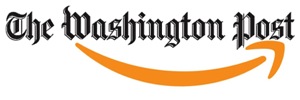Why Bezos Buying the Post Makes Sense … to Me
My Twitter, Facebook and RSS feeds have all been overflowing with comments on the news that Amazon.com founder Jeff Bezos bought the venerable Washington Post earlier this week. Most are filled with confusion, some derision, but it wasn’t until I read John Cassidy’s piece in the New Yorker that my thoughts were clarified.
Because I completely disagree with him.
 I think Bezos buying the Post is brilliant – if he executes running it as well as he has Amazon.com.
I think Bezos buying the Post is brilliant – if he executes running it as well as he has Amazon.com.
The Post is one of the few truly unique publications out there. It’s audience is wonderfully fractured into three distinct components and, when I think about Amazon.com, I see some stunning parallels.
Until Bezos birthed the first large-scale online shopping company, we shopped locally. We paid attention to national ads and national trends, but we went to our (physically) local retail shops to spend our money, then showed them off to our local friends – local, national, local.
What Amazon.com did was take the first part of that local connection out – we now respond to national ads and trends by heading to Amazon.com where we can shop in the comfort and convenience of our slippers, then wait until a local delivery truck rolls up with our newest thing. Then, we can show it off to our friends, in person or online – local/national, national, local/national.
Amazon.com upset the balance between local and national at a massive level – neither retailers nor shoppers are thinking about stuff the same way anymore.
The Post has the same struggles as most newspapers do which Cassidy goes through. However, they have a unique audience. Cassidy sees this as being the problem:
The problem with the Post is that it’s neither fish nor fowl—or, rather, it’s both. First and foremost, it’s a metropolitan newspaper with a near monopoly on the market in D.C. and its environs. I don’t know what the figure is these days, but years ago it used to have a market share of more than ninety per cent, which translated into a very lucrative business of selling advertising space for things like real estate, job openings, and retail. But the Post was (and is) also a paper with ambitions of challenging the Times and the Wall Street Journal on the national stage, which means it has to spend a lot of money on national and international reporting.
I see that as the advantage. The Post can play to three audiences if it markets itself right:
- Local Washingtonians who care about local and national news
- The transients who live in the D.C. area who need a source for national perspectives on national news (as many government employees aren’t from there)
- The out-of-towners who want to know what their local representatives are doing – and how it affects them
If they do local well, they win with the first and second crowds. If they do national well, they win with the second and third crowds – local, national, local/national.
Which means the Post has the capacity to be the national newspaper – something The New York Times doesn’t because it really won’t ever focus on local in Washington, leaving a hole in its readership.
Now, can Bezos execute that? Given how often the smiley boxes get tossed out of local UPS trucks in my neighborhood, I think he might be able to.